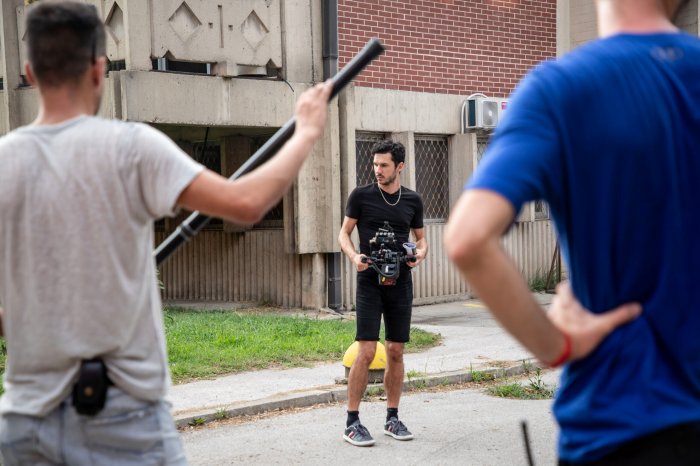“Anybody has better things to do than listen to me,” declares Keith Sontag (Dore Mann), the hero of “Frownland.” The film takes a big risk in placing at center stage a guy many of us would dash out of a subway car to avoid having to listen to. “Frownland” offers the flipside of American independent cinema's common glorification of all things and people quirky and eccentric. It depicts a truly marginal man, an outsider so quirky that he can barely finish a coherent sentence and so eccentric that he's a step away from homelessness.
Imagine where the pregnant teen Juno would be without money, charm, beauty, a sense of humor, and a supportive family. Five years in the making, director Ronald Bronstein's labor of love isn't the sort of gentle film usually described as “humanist.” It's anything but comforting. However, it's also deeply compassionate.
FROWNLAND
Directed by Ronald Bronstein
Frownland, Inc.
Opens Mar. 7
IFC Center
“Frownland” begins with Keith watching a monster movie on TV. Laura (Mary Wall), who likes to draw comic books and cut herself, buzzes his apartment. They go for a ride. After he talks hesitantly, she gets out of the car and then returns. They go back to his apartment, but when she lies down on his bed, her face turns red due to an allergy to down pillows. Rather than getting up, she rubs her face in the pillow, showing her masochistic streak. Eventually, she leaves.
Ronald Bronstein's debut film examines a deeply troubled man.
Keith's job involves selling booklets of coupons on Long Island. His roommate Charles (Paul Grimstad) is a snide musician who constantly fiddles with synthesizers and drum machines but can't pay the electric bill on time. Keith frequently visits his irritated friend Sandy (David Sandholm) in the middle of the night.
“Frownland” has benefited from association with the “mumblecore” movement, although its confrontational ethos is far from the genial, ramshackle atmosphere of films like Aaron Katz's “Quiet City” and Joe Swanberg's “Hannah Takes The Stairs.” Bronstein and Wall, his wife, who recently completed her own directorial debut, acted in “Butterknife,” an Internet-based series by Swanberg. At its worst, mumblecore offers aimless improv in the guise of raw truth. The performances in “Frownland” are raw and believable, yet they're stylized in ways that aren't instantly obvious.
“Frownland” seems spontaneous, but Keith's outbursts of stuttering, twitching, and mumbling must have been rehearsed to attain such the grating effect they have. The film's levels of sheer dread couldn't come by accident. When the cast appeared at the Museum of Modern Art last year for a Q&A, it was notable that they all appeared far more attractive in person than they were on-screen. Usually, the opposite is true.
Bronstein's style stems from his actors' body language, with cinematographer Sean Williams' 16mm camera following Keith as he paces back and forth. He's a man uncomfortable in his own skin, and the film aims to make us share his anxiety.
The direction is naturalistic, yet “Frownland” makes a major departure from that style, using hellish red lighting in one scene to suggest the horror a party induces in Keith. Listening to the electronic score is like being subjected to the '70s synth-prog band Tangerine Dream while suffering a migraine.
Mumblecore has been criticized ad nauseam as white male middle-class navel-gazing. Filmmakers like Swanberg and Katz may truly be reflecting their segregated reality, but their work suggests that they never leave the bubbles of Park Slope and Williamsburg.
All of the major characters in “Frownland” are white, but the film shows a far greater interest in the world than Bronstein's peers achieve, examining what it's like to be poor in New York. The only hipsters in sight turn up at the party scene near the end, and they may as well have sprung from a David Lynch nightmare.
The casual cruelty expressed in “Frownland” is more shocking than the violence in the Coen brothers' “No Country For Old Men,” because emotional carnage retains a taboo quality in American cinema that no longer attaches to physical bloodshed. As villains go, the blunt Charles gives Anton Chigurh a run for his money.
Still, “Frownland” is more complex in its sympathies than it initially appears. Late in the film, it abandons Keith to follow Charles as he applies for a job as a waiter and then takes the exams for law school, interacting with a guy who's even more condescending than he. These scenes don't make Charles any more likable but they explain that in his own way, he's almost as baffled by the world as Keith.
If not for its dark sense of humor, “Frownland” would be unwatchably grim. Bronstein mines the comedy of embarrassment exemplified by Larry David, Ricky Gervais, and early Albert Brooks. “Frownland” walks a tightrope between button-pushing and an honest evocation of a horribly troubled character. Bronstein may be a deliberate provocateur, but there's more genuine curiosity about the human condition on display here – and less certainty about it – than you'll find in the work of Lars von Trier or Neil LaBute.
One senses that he made the film to raise questions about behavior and social interaction, not to push around his characters in order to reach a foregone, misanthropic conclusion. At heart, “Frownland” cares deeply about Keith. It's just not interested in offering 106 minutes of an easily palatable character, trusting instead that we'll find the humanity underneath Keith's torrent of anxiety.

































